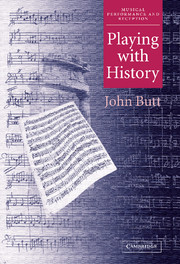Book contents
- Frontmatter
- Contents
- Preface
- Acknowledgements
- List of abbreviations
- PART 1 HISTORICALLY INFORMED PERFORMANCE IN MUSIC CRITICISM
- PART 2 HISTORICALLY INFORMED PERFORMANCE AND THE IMPLICATIONS FOR WORK, COMPOSER AND NOTATION
- 2 Historical performance and ‘truth to the work’: history and the subversion of Platonism
- 3 Historical performance and ‘truth to the composer’: rehabilitating intention
- 4 Negotiating between work, composer and performer: rewriting the story of notational progress
- PART 3 HISTORICALLY INFORMED PERFORMANCE WITHIN THE CULTURE OF THE LATE TWENTIETH CENTURY
- Notes
- Bibliography
- Index
3 - Historical performance and ‘truth to the composer’: rehabilitating intention
Published online by Cambridge University Press: 02 December 2009
- Frontmatter
- Contents
- Preface
- Acknowledgements
- List of abbreviations
- PART 1 HISTORICALLY INFORMED PERFORMANCE IN MUSIC CRITICISM
- PART 2 HISTORICALLY INFORMED PERFORMANCE AND THE IMPLICATIONS FOR WORK, COMPOSER AND NOTATION
- 2 Historical performance and ‘truth to the work’: history and the subversion of Platonism
- 3 Historical performance and ‘truth to the composer’: rehabilitating intention
- 4 Negotiating between work, composer and performer: rewriting the story of notational progress
- PART 3 HISTORICALLY INFORMED PERFORMANCE WITHIN THE CULTURE OF THE LATE TWENTIETH CENTURY
- Notes
- Bibliography
- Index
Summary
Performance malpractice … is not permissible, nor in the remotest degree forgivable … when tolerated or fostered by radio and television corporations, record companies, and concert-giving bodies … If there is to be rhyme or reason in musical performances, it is essential that they should reflect, as nearly as possible, the intentions of the composer. What these intentions were, and the correct way to interpret them, are as much the province of the professional musicologist as microphone placement and tape-editing are the concern of the professional sound engineer. When proper advice and interpretation are ignored, chaos results.
Denis Stevens, 1972For many performers throughout the twentieth century it has been self-evident that one's foremost priority in the theory and practice of performance should be to follow the composer's intentions. Those who espouse the concept of HIP often believe that this can be achieved by finding out as precisely as possible what the composer desired and expected of his performers, an attitude that has been ubiquitous since the 1950s. Denis Stevens (above) articulates the common conception that it is the musicologist's task to discern ‘the facts’ and then pass these on to the obedient performer. In the same passage he asserts that this is the only responsible policy for the media promoting performance, who have a duty to provide the public with ‘entertainment or instruction of the finest possible quality, born of the best possible brains’. Discerning the composer's intentions is thus evidence of an active and finely honed intellect.
- Type
- Chapter
- Information
- Playing with HistoryThe Historical Approach to Musical Performance, pp. 74 - 95Publisher: Cambridge University PressPrint publication year: 2002

